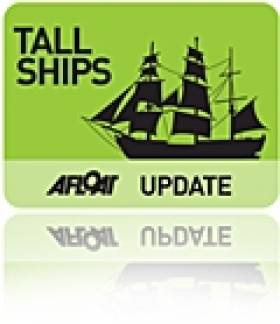Displaying items by tag: Sovereign Islands
Four RNLI Lifeboats Rescue Crew From Sunken Tall Ship Astrid
#TallShips - Four RNLI lifeboats were involved in the rescue of 30 crew from the tall ship Astrid, which sank off the Cork coast earlier today (Wednesday 24 July).
The 42m Dutch training vessel reportedly hit rocks inside the Sovereign Islands at Ballymacus Point, near Kinsale.
All on board were brought to safety when the Kinsale lifeboat transferred the casualties from the sinking ship onto the Courtmacsherry RNLI lifeboat and a local vessel. They were then taken to Kinsale.
Both Kinsale and Courtmacsherry RNLI lifeboats were called out at 12 noon today to go to the immediate aid of the sail training vessel that had got into difficulties on the western entrance to Kinsale Harbour in Cork.
Ballycotton and Crosshaven RNLI were also launched, though the Kinsale RNLI lifeboat was first on scene. There was a 2m swell and winds were force five to six.
The training vessel had lost power and was apparently driven on to rocks by a strong southerly wind at the western entrance to Kinsale Harbour. The grounded vessel was taking on water and a crewmember from Kinsale RNLI was put onboard.
Eighteen of the casualties were taken off the Astrid by Kinsale RNLI lifeboat and transferred to Courtmacsherry lifeboa, before being brought to safety. The remaining 12 were put onto a liferaft deployed by the Astrid’s crew, which was towed to safety by the Kinsale lifeboat and picked up by a local vessel.
The people on board the liferaft were then taken to Kinsale harbour and assessed by medical teams.
Irish Coast Guard helicopters from Waterford and Shannon were also on scene along with ambulances and medical crews from Cork.
Speaking about the call-out, Courtmacsherry RNLI coxswain Sean O’Farrell said: “Everyone was very fortunate. I want to praise the quick thinking of the skipper and the crew from the Astrid. They kept calm and did everything we asked them to do. We were able to get them to safety quickly and a major tragedy was averted. To be able to recover 30 people safely was a great day for everyone involved.”
Meanwhile, the Irish Sailing Association has issued the following media statement on behalf of the tall ship Astrid:
Tall Ship Astrid was on a voyage from Southampton to Cherbourg calling in to Kinsale. On board were 23 trainees from France, Ireland, the Netherlands, UK and Spain. The crew were from Belgium and the captain, Pieter de Kam was from the Netherlands.
As the Astrid was leaving Oysterhaven, as part of The Gathering Cruise parade of sail to Kinsale, the vessel experienced engine failure. They notified a nearby RIB which was being helmed by Irish Sailing Association (ISA) CEO Harry Hermon.
The RIB attempted to take a line from Astrid. However, due to the onshore winds and swell this was not possible. Captain de Kam issued a May Day.
The ISA RIB and the yachts in The Gathering Cruise flotilla stood by until the RNLI arrived. There was a safe rescue of all 30 crew who were brought to Kinsale on board the yacht Spirit of Oysterhaven and the lifeboat. All crew were brought to Kinsale Yacht Club where they were provided with showers, food and dry clothing. They were all medically checked and are in good health.
Sail Training Ireland and Kinsale Yacht Club are working together to make arrangements for accommodation and for returning the crew to their homes.
Commenting on the rescue, Captain Pieter de Kam of the Tall Ship Astrid stated: “I would like to thank the lifeboat and the coastguard for the safe rescue of all my crew. We very much appreciate their outstanding work.”
Harry Hermon, CEO of the Irish Sailing Association, commented: “It is thanks to the rescue services that all crew were rescued quickly and safely without injury. I would also like to thank all the sailors from the Gathering Cruise who stood by Astrid providing support to the crew.
"Kinsale Yacht Club has also been fantastic providing food and clothing and helping Sail Training Ireland find accommodation for all the crew”.
























































